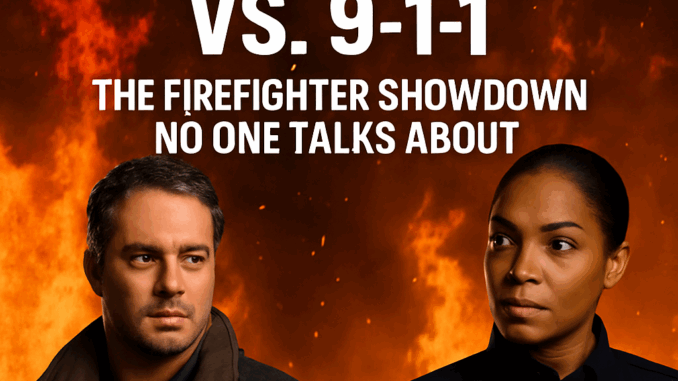
In the world of TV dramas, few shows burn hotter than Chicago Fire and 9-1-1. On the surface, they both follow brave first responders through high-stakes emergencies and personal chaos. But behind the flames, these two franchises are locked in a quiet battle for viewers, prestige—and emotional loyalty.
And fans are starting to ask: which one really gets it right?
Firehouse 51 vs. Station 118: Two Worlds, Two Rules
Chicago Fire, the anchor of NBC’s “One Chicago” franchise, is gritty, slow-burning, and deeply rooted in character development. It thrives on long-form arcs—relationships that evolve over seasons, and a workplace that feels lived-in. Firehouse 51 isn’t just a team. It’s a family. Viewers know these characters’ pasts, traumas, and flaws.
Meanwhile, 9-1-1, FOX’s adrenaline-fueled response, is chaos in high definition. Created by Ryan Murphy, it thrives on weekly spectacle. One week it’s a plane crash. The next? A giant sinkhole swallows a city block. The emergencies are cinematic, and the pacing is lightning fast. The emotional stakes are high—but sometimes feel rushed.
Realism vs. Drama: What Are You Really Watching?
One key difference? Realism.
Chicago Fire prides itself on portraying emergency protocols and firefighting strategies with authenticity. Technical advisors are on set. Characters often fail. Not every rescue is successful, and injuries carry consequences.
9-1-1 goes the other way. It’s entertainment-first. Suspenseful rescues, extreme disasters, and jaw-dropping visuals dominate. It’s the kind of show where a rollercoaster derailment is just a normal Tuesday. And yet—it works. Because even in the madness, it delivers surprisingly emotional moments.
The question is: do you want your drama grounded… or explosive?
Romance, Pain, and Secrets
Both shows lean into romance, but in different ways.
Chicago Fire takes its time. Severide and Kidd? Slow burn. Casey and Brett? Complicated, emotional, and stretched over years. These couples are rooted in character growth and vulnerability.
On 9-1-1, love stories explode, break apart, and return all in a single season. Buck and Eddie? A will-they-won’t-they fan storm. Athena and Bobby? A marriage tested by trauma and secrets. It’s fast and passionate—but not always lasting.
And let’s not forget the hidden secrets. Chicago Fire thrives on quiet revelations—a parent’s death, a hidden addiction, a betrayal uncovered in the middle of a rescue. 9-1-1 thrives on secrets revealed with flair—DNA shocks, surprise relatives, and hidden pasts that unravel during natural disasters.
Behind-the-Scenes Drama?
Interestingly, Chicago Fire has faced more real-world cast shakeups. Taylor Kinney’s unexpected departure sent fans reeling. Characters exit with little warning, leaving long-lasting gaps in storylines.
9-1-1, on the other hand, shocked the world by moving from FOX to ABC—a network leap that stirred speculation about budget conflicts and network tension. And while cast exits are rarer, fans constantly fear cancellation due to the high production costs of its disaster-driven format.
So, Which One Wins?
It depends what you’re looking for.
If you want emotionally grounded, character-rich storytelling with slow-burning arcs and subtle stakes, Chicago Fire delivers. It feels like a series that could happen in real life.
But if you crave edge-of-your-seat, high-octane thrills and emotionally explosive episodes with movie-level disasters, 9-1-1 is your ride.
And maybe that’s the real story: two firefighter dramas, burning with completely different fuels—one grounded in reality, the other built for spectacle.
But only one can light your screen on fire.